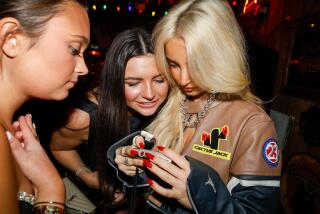Stereotype of Teens Flourishes Despite Reality
- Share via
My hair is not blond. My eyes are not blue. I don’t bribe my teachers, nor do I secretly steal my sister’s boyfriends. My life never has revolved around winning the homecoming queen election, and I most certainly do not obsess about sex.
Funny how the media endorse such characteristics that are supposed to epitomize the average teen, yet I can’t seem to identify any of them as my own. Am I not hormonal enough? Should my grades be lower? Perhaps my ideas ought to include more evilness. The image of the modern teen depicted by the media is nothing more than a generalized view sandwiched between two extremes: the bubble-brain supermodel or the pseudo-deep, suicidal maniac.
Although those images represent opposite ends of the adolescent spectrum, they together illustrate teenagers as unintelligent, self-absorbed and uninvolved.
Television shows can’t seem to get enough of these distortions, focusing entire dramas on beautiful morons or confused geniuses. Sometimes producers get really imaginative and try to incorporate both into one show. In “Dawson’s Creek,” for example, twentysomething actors spout superfluous dialogue when discussing the very intellectual topic of (what else?) teenage sex.
Maybe instead of taking SAT-preparation classes, we teenagers should just study vocabulary from “Dawson’s Creek.” Not only would we learn words like “perturbed” and “innocuous,” we also would absorb “helpful information” about the joys of unprotected intercourse.
“Felicity,” another wonderful Warner Bros. creation, is merely a mature version of “Dawson’s Creek.” These post-teenage characters continue to discuss the same subjects, yet here they attend New York University, not high school. At exactly what age does our teen stereotype come to an end?
It certainly never will if the media continue to confuse the reality of high school with their glamorous illusion. Recent movies such as “American Pie” and “Can’t Hardly Wait” include scenes of raging senior house parties with the football players huddled around a keg of beer and the kissing couple hiding out in the parents’ bedroom. Every girl lusts after that one guy, and every guy lusts after that one girl.
That’s the fantasy. In reality, rambunctious senior parties seldom surface, for most of us transform into homebodies on weekends in order to type up college applications or feverishly crank out admission essays. If we’re not at home, we’re out and about our communities and schools in projects--real projects, involved with child abuse, literacy or health care.
In the summer, we’re not doing a real-life audition for “Baywatch.” Instead, thousands of us continue our education, work one or more jobs and find time for family and community responsibilities as well.
Yes, teenagers do volunteer. We’re independent. We possess freethinking minds, and we have plenty to say. OK, it seems too perfect to be true. I might have lied a tiny bit. Maybe not all American teenagers are Eagle Scouts and soon to be recipients of the Nobel Peace Prize. Scattered between the lines are the pot-smoking teens and the 10-year-old girls becoming pregnant because of unprotected intercourse and the teens who would rather shoot themselves in the foot than help pick up trash at the beach for an hour.
It’s reality. In every gathering, the dud is always present. But let’s not allow that dud to spoil the entire collection. True, some teenagers do drugs, have sex, hate school and despise their community. Yet some teenagers choose the other fork in the road, but rarely are they the ones spoken about.
The media and even parents just love to discuss the teens with problems, never the ones who try to fix them. They allow their minds to be clouded by a single judgment: their own.
The problem is that no one asks. Rarely does anyone invite us to present our opinions, and during the infrequent occasions when they do, they pose questions that reaffirm their own stereotypes. Stupid questions receive stupid answers.
Adults won’t ask simply because they repudiate our awareness and motivation. Do they believe the media stereotypes? Is a world turning dotcom causing them to lose their balance in some way? Is their white-dominated society threatened by our more diverse and accepting vision?
Teenagers crave self-advancement, and no doubt we have progressed far beyond adult expectations. Yet they’ve still not budged from their rut of chosen blindness. How much more involved can we be? How many more clubs must we join? How many more lives must we touch before we may evolve beyond their perceptions of alcohol, parties, laziness and sex?
We’re eager to improve and embrace the world with our energetic minds, but will they let us?
More to Read
The complete guide to home viewing
Get Screen Gab for everything about the TV shows and streaming movies everyone’s talking about.
You may occasionally receive promotional content from the Los Angeles Times.






